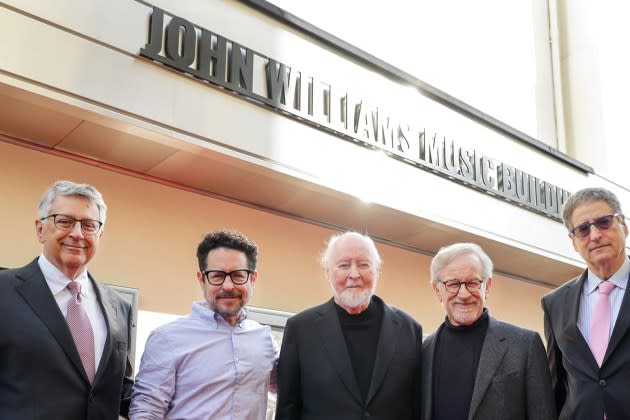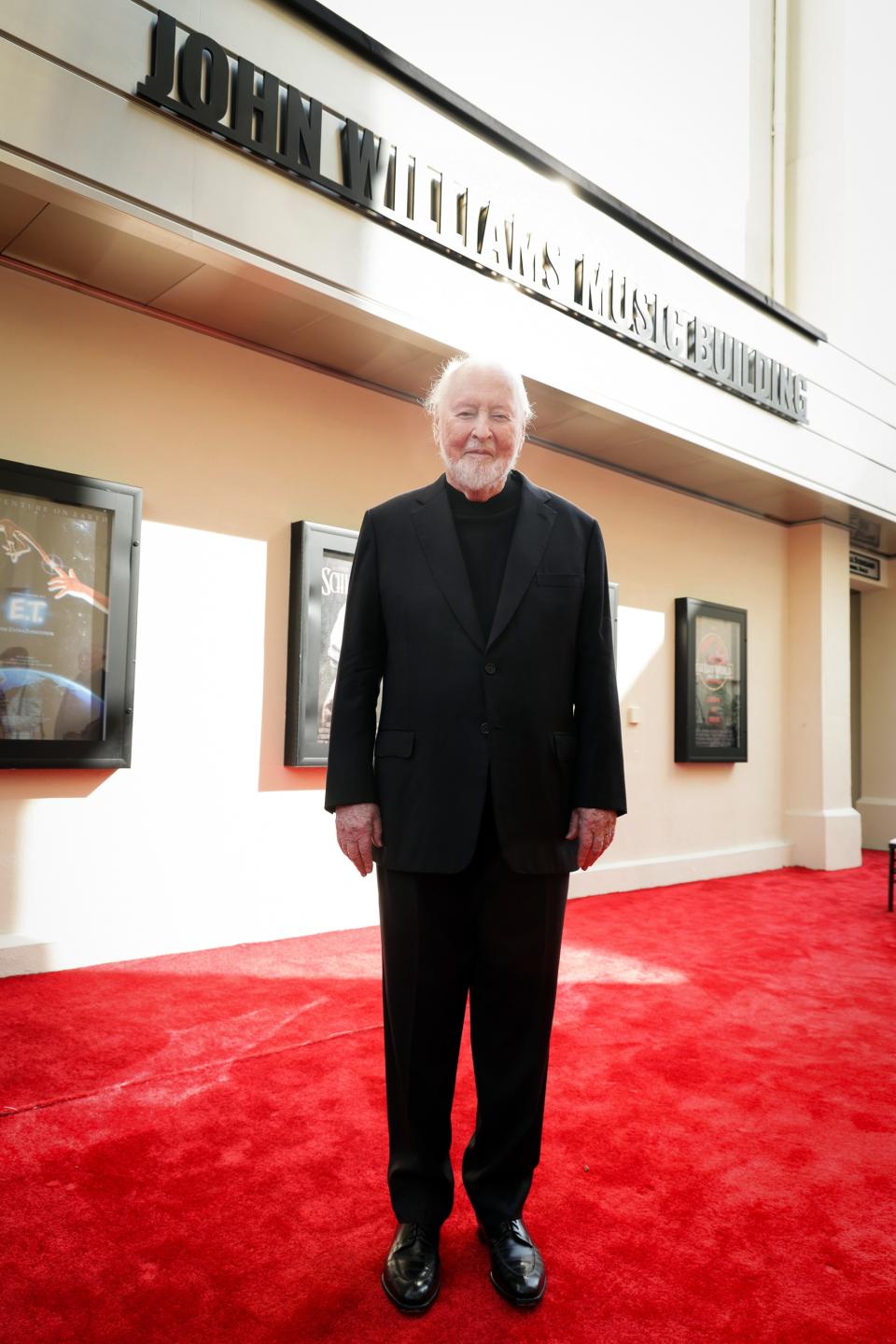Sony Pictures Entertainment Dedicates John Williams Music Building At Studio With A Little Help From Steven Spielberg, J.J. Abrams & More


“The first time I came to this studio was 1940 when my father brought me here to show me the stage, and I was about 9 or 10 years old, and I thought, ‘Some day this will all be mine!’ It’s finally come to be – it’s only taken me 92 years to get here!” That’s what five-time Oscar winner and 53-time nominee John Williams said as the curtain was raised on the iconic Sony Pictures Entertainment lot’s newly renamed John Williams Music Building.
Joining in the celebration — and it was a celebration — were Sony Pictures Motion Picture Group Chairman and CEO Tom Rothman, SPE Chairman and CEO Tony Vinciquerra (who made opening remarks), filmmaker J.J. Abrams and of course, Williams’ longtime collaborator Steven Spielberg, who instigated the idea of putting the legendary composer’s name on the building where they have worked on 20 or their 29 films, as Spielberg noted.
More from Deadline
Rothman made some interesting comparisons in his speech. “So here it is, Michael Jordan or LeBron James? Jack Nicklaus or Tiger Woods? The greatest Impressionist — Manet or Van Gogh? I got one for you: the greatest movie director of all time, Steven Spielberg or Stanley Kubrick? I vote you (looking at Spielberg in the front row), but I am saying it’s an argument, ” he laughed. “But the greatest film composer of all time? The undisputed heavyweight champion on that there is no argument. John Williiams is the GOAT.”
Rothman added: “This month marks the 100th anniversary of Columbia Pictures. How fitting the timing that to the pantheon of names that grace the buildings on this historic lot – like Capra, Poitier, Lear, Thalberg – we add Williams, the greatest film composer of all time, to the very building where so much of the joy he created happened.”

Abrams, for whom Williams scored Star Wars films The Force Awakens and The Rise of Skywalker in this building, relayed a story about an art assignment he had as a third-grader, where the kids were asked to draw something meaningful on a small wooden plank. He drew the poster for Jaws, but at the bottom simply wrote, “Music by John Williams” in describing the impact the score had on him. “Being here to celebrate this with you is meaningful. The third-grade me is freaking out,” he told Williams.
Abrams added: “There is no more magical being than John Williams. Johnny is able to tap into another realm — a profound, universal, utterly human place. Like an emotional wizard, he galvanizes a world, a spirit. He doesn’t just define the tone and power of a film but elevates it into the pantheon. Every new score of his feels delightfully stunning, fresh and yet inevitable. He’s filled our lives with some of the greatest art ever produced by humankind. I am endlessly grateful for what he does and who he is.”
Spielberg, speaking without notes but undeniably from the heart, relayed a story about his childhood love for film scores and soundtrack albums. He mentioned several of the industry’s greatest composers but told about a visit to a record store in 1969 where he bought the album of Williams’ music for the Steve McQueen film The Reivers. Even though he had not seen the film, he fell in love with the score. About four years later, in doing his first feature film, The Sugarland Express, he asked producers Dick Zanuck and David Brown if he could get a meeting with Williams. They had lunch, and Spielberg said from that point he knew they would be connected as friends and in the movies.
This anecdote really resonated with me because I am, and have always been, a massive soundtrack collector and aficionado from 45s to vinyl LPs to CDs, which have overrun my home. When I was working at Entertainment Tonight in the ’80s as the movie segment producer, I got to do a shoot on a Fox scoring stage where Williams let us film him conducting his score for Space Camp. I rarely ask for autographs, but in this case I had to do it, and out of my Williams stash of soundtracks I took The Reivers with me and he not only signed it, he signed it with a lovely note in huge letters that take up the entire cover all over McQueen’s face (!). It is, as far as I am concerned, a treasure.
RELATED: John Williams First Composer To Score AFI Life Achievement Award
More from Spielberg at the Culver City event: “I have grown up with Johnny from the very beginning. What he’s done for me is something I haven’t been able to imagine. This building is where all my stress dissipates … when I finally get to this stage of a production, and I know I’m in your hands. In the end, I don’t recognize the movies as mine but as ours. Thank you Johnny — my movies would not be the same without you.”
The Culver City lot’s building also houses the Cary Grant Theatre and the Barbra Streisand Scoring Stage, and even though just outside its doors were the invited audience of fellow composers — I spotted Thomas Newman and William Ross, among others — friends like producer Frank Marshall and family sat, there was an active session inside in progress for Ghostbusters: Frozen Empire. As the post-event light lunch was starting, I caught up with Rothman, who went out of his way to take me inside, even though we had to wait for someone with the combination for the locked door and for the red light to stop. Rothman walked in and explained to everyone the studio had just named the building after John Williams, and we wanted to see how it was working. So cool to see, and in his remarks Williams noted it was his hope that young composers and musicians could come here for years in the future and find the same kind of creative joy he has.
For Columbia Pictures itself, Williams has scored the iconic Spielberg film Close Encounters of the Third Kind, The Adventures of Tintin, The Patriot, and one of my top three Williams scores, Memoirs of a Geisha. I checked IMDb, and he had an early connection to Columbia just starting out in the ’50s as an orchestrator for Gidget and early scores of his such as 1962’s Diamond Head, when he went by Johnny Williams. Of course his work from E.T. The Extra Terrestrial and Schindler’s List to Star Wars to Indiana Jones, Superman, Harry Potter and countless others cross many studios, but this one clearly is home for him, musically speaking. Rothman told me even if the financials don’t always add up in the way movies are made today (and so many scoring sessions going overseas), as long as there a breath in him, he will not let anyone touch this magic place. In other words, it will always be where music lives.
In referencing Spielberg’s remarks about the building where his filmmaking stress “dissipates,” Williams amusingly stated, “This building is where all my stress begins.” The legend clearly was moved by all this as he looked up at the new marquee with his name on it. “I have such a reverence for this place. I love it. This is bigger than ‘thank you’ – there are no words that can capture it in the English language; our language stops there. This is beyond an honor.”
Oh, but in offering advice on how they might make the John Williams Music Building even better, he turned to Rothman and made a suggestion: “Actually, Tom, we could use a couple more bathrooms for the orchestra.”
Best of Deadline
'Wizards Of Waverly Place' Cast Through The Years: A Photo Gallery
TV Cancellations Photo Gallery: Series Ending In 2024 & Beyond
Hollywood & Media Deaths In 2024: Photo Gallery & Obituaries
Sign up for Deadline's Newsletter. For the latest news, follow us on Facebook, Twitter, and Instagram.


